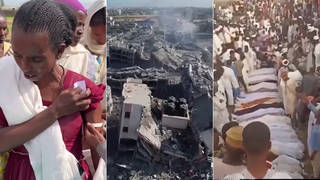
Topics
Guests
- Adebayo Olukoshidistinguished research professor at the Wits School of Governance who served as former director for the African Social Science Council, the U.N. African Institute for Economic Development and Planning, and the Africa and West Asia Office of International IDEA.
The Ethiopian government and forces in Tigray have reached a truce to end two years of brutal civil war. The new peace deal follows a week of peace talks mediated by the African Union in South Africa. The Ethiopian government wants a unified country, and Tigrayans want minoritarian rights upheld, says Adebayo Olukoshi, distinguished research professor at the Wits School of Governance who formerly worked on peace efforts in Tigray with the International IDEA. The agreement comes as “a big relief,” and “there’s hope that the two sides will adhere to the agreement,” he says.
Transcript
AMY GOODMAN: Professor Olukoshi, before we end the show, we wanted to get to this new peace deal between Ethiopia and forces in Tigray to end a devastating two-year war, the agreement announced on Wednesday after a week of African Union-mediated talks in South Africa, where you are. The United Nations says 5.2 million people in Tigray are in urgent need of humanitarian assistance. By some estimates, up to 800,000 people have died as a result of the war, which began two years ago today. Your comments on the deal that was reached?
ADEBAYO OLUKOSHI: Well, a big relief and an endless hope that the two sides will adhere to the agreement. This is a war which has been seen by most Africans to be highly regrettable. Ethiopia, as a country, was at the forefront of progress in terms of economic growth and transformation. You would recall that for a period of almost a decade, Ethiopia ranked amongst the fastest-growing countries in the world, sometimes even competing with China. And this war has been disruptive of that whole process, in addition to exacting all of the costs in human life and damage to property that we have seen.
And I hope that in the context of the realization by both sides that it might in the end be the case that there will be no clear victor from this conflict, but they would sit down to work out the kind of political solution that will accommodate the concerns of all sides, the concern by Ethiopia to keep a country united and the territorial integrity of the country respected, and the concern by the Tigrayans for minority rights to be upheld and fully recognized in the Constitution.
AMY GOODMAN: And how will it be enforced?
ADEBAYO OLUKOSHI: Well, a lot will depend on the political will on both sides. And as I said, I hope, first and foremost, that there is a realization now on both sides, and a lot of pressure has been piled on both Addis Ababa and Mek’ele from within Africa, from the African Union, from key and influential voices across the continent, as also there has been pressure from the United Nations and places like Washington and Brussels, on both sides, to at least ceasefire.
There is, of course, the question of Eritrea, which also has to withdraw its troops from Tigray as part of this process. And hopefully the African Union will set up a monitoring mechanism immediately that will enable it to see the extent to which the parties are acting in good faith in accordance with the agreement which they have reached. Some tough concessions have had to be made, I would say particularly by the Tigrayans. But they are also backed into a corner presently. And the cost of the war has been particularly heavy on the people of Tigray, that it would really makes sense for them to continue to show the goodwill that will sustain the ceasefire and open the pathway towards constitutional and broader political negotiations.
NERMEEN SHAIKH: Professor, you mentioned Eritrea. Of course, they play a critical role in this war, but they were not included in the negotiations. We just have 30 seconds. If you could explain the significance of that?
ADEBAYO OLUKOSHI: Well, I mean, officially, Eritrea has not admitted to being made party to the war, even though we all know that there are Eritrean troops fighting alongside the Ethiopians. I imagine that to the extent to which Addis Ababa, which is in a strategic alliance with Asmara, adheres to the agreement that has just been reached, it will indeed be able to transfer the full effects of the ceasefire to the authorities in Asmara.
AMY GOODMAN: Well, Adebayo Olukoshi, we want to thank you so much for being with us, distinguished research professor at the Wits School of Governance in Johannesburg, previously served as director of the African Social Science Council and the U.N. African Institute for Economic Development and Planning, speaking to us from Johannesburg, South Africa.
Again, tune in on November 8th for our three-hour midterm election night special. We’ll be broadcasting live starting at 9 p.m. Eastern. You can go to democracynow.org for more information.
Democracy Now! is currently accepting applications for a video news production fellowship and a people and culture manager. Learn more and apply at democracynow.org. Democracy Now! produced with Renée Feltz, Mike Burke, Deena Guzder, Messiah Rhodes. I’m Amy Goodman, with Nermeen Shaikh. Stay safe.












Media Options